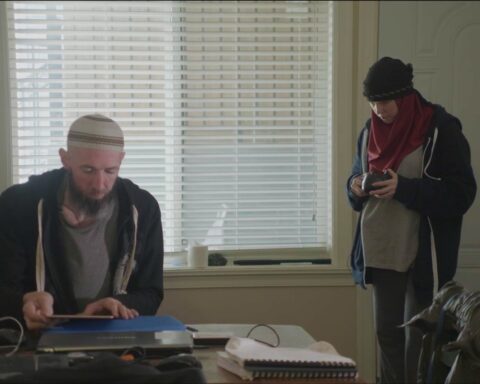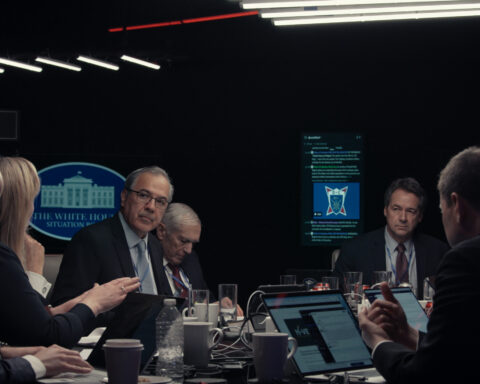The Final Year
(USA, 89 min.)
Dir. Greg Barker
Don’t let The Final Year get you down. See it as an optimistic reminder of goodwill, rather than a tragic portrait of lost progress.
It’s been one year since Donald Trump took the presidency and turned the world into a “shithole.” It’s been two years since director Greg Barker started following Trump’s predecessor, Barack Obama, and documenting the final twelve months in his second term as president of the U.S.A. One can debate if Barker sensed Trump’s unfortunate victory during the course of filming or if The Final Year partly results from good editing. (A tip of the hat must go to editors Joshua Altman and Langdon Page for wading through the material and making something that doesn’t play like yesterday’s news.) One might be inclined to say the latter, since the film features a few scenes in which the director asks members of the Obama team what they think of Trump’s prospects. There’s an impending sense of doom to the proceedings even if one knows the outcome.
Deputy National Security Adviser and “presidential confidant” Ben Rhodes waves off the idea of a Trump victory even though a perceptive graduate student in Vietnam wonders if Brexit’s result should worry him. Secretary of State John Kerry, on the other hand, is conservatively pragmatic when it comes to handing off the achievements of one administration to the next administration. There are acknowledgements of the currents of Trumpian xenophobia in the air, like when Rhodes remarks on the uneasiness felt by his assistant who wears a hijab, but it’s clear the administration anticipated a continuation of the progress they’d made. If only.
The success of the Obama years comes in the improvements to foreign policy made by the team of Democrats. (One must acknowledge, however, that the full measure of a presidency needs more than a few months to digest.) Barker goes behind the scenes with Obama’s key players like Rhodes, Kerry, UN Ambassador Samantha Power, National Security Adviser Susan Rice, and a horde of busy worker bees to illustrate the former president’s effort to make the most of his remaining days in office. The Final Year follows Power to Nigeria where she meets grieving mothers to listen and reassure them that the U.S.A. is using all its might to bring the safe return of their kidnapped daughters. This scene, in which Power sits with the women and lets them take their time and pause to cry, encapsulates much of what distinguishes the Obama camp from the Trump administration: they actually cared about people.
The Final Year offers several examples that support the Obama administration’s forward-looking effort to improve human rights while juggling two wars that the previous president began. Much of the progress made by Obama and his team comes through qualities and efforts that define good leadership in any scenario: active listening, compassion, a pool of diverse minds and thinkers, and decisions based on facts. (Real facts, not alternative ones.) Scenes in Laos acknowledge the covert war that Nixon waged while taking heat for Vietnam. A touching speech in Hiroshima by Obama bravely brings the President to the site of one of his country’s worst deeds in order to make peace, which includes a heartfelt one-on-one with a survivor of the nuclear blast. The team debates the complexity of the civil war in Syria and asks if the U.S.A’s past wrongdoings in Iraq and Afghanistan provide cautionary tales against intervention. One might cynically call The Final Year a highlight reel for Obama, but Barker’s footage shows how easily the direction of the world can swing with the character and integrity of a single powerful head of state.
It’s also worthwhile that Barker gets such impressive coverage of the team and of Obama’s events, since his access to the former president is limited at best. The Final Year nabs only one interview with Obama and it’s a casual backstage chat at an event. This footage, which Barker and his crew disperse throughout the film, demonstrates Obama’s charisma, eloquence, and character—but we already knew that. Don’t go in expecting a big reflection from Obama on his legacy and his fears of what may come under Trump’s reign. It’s far too soon for that.
The Final Year instead requires a bit more active viewing and a willingness to compare one president to the next. For example, the fact that Barker even gets an interview with Obama is a lot more than a liberal filmmaker could expect with Trump. Similarly, one touching scene sees Power welcome a group of immigrants to the country as they take the oath for citizenship. Power draws upon her own experience arriving to the States from Ireland at age nine and she sheds some tears while expressing her gratitude to the new citizens, which include her children’s nanny among the group, and uses herself as living proof of the opportunities her country provides if one uses one’s rights as an American responsibly. If only the current administration could show the same humanity.
Had Trump’s far more superior, qualified, and “presidential” rival Hillary Clinton won the election as many pundits, optimists, and subjects in this very film thought she would, Barker might have nothing more than an okay, but moderately revealing insider’s look behind the curtain of the White House. Instead, with Trump obliterating much of the progress made by the Obama administration and gutting the U.S.A’s stature on the world stage, The Final Year provides a necessary call to arms for Americans to reclaim their country. It’s a reminder of what good leadership looks like and a hopeful nod to the future Obamas awaiting higher office.
The Final Year opens at Hot Docs Ted Rogers Cinema on Friday, Jan. 19.
For a second take on the film, read Daniel Glassman’s review from TIFF .











